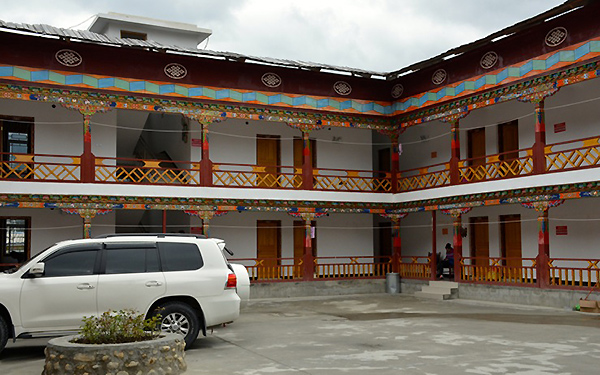Redemption for Tibetan loggers turned ecotourism pioneers
Updated: 2015-08-11 09:23
By Chen Bei in Tibet(chinadaily.com.cn)
|
|||||||||||
 |
|
Pasang Tsering's family inn. [Photo by Chen Bei/chinadaily.com.cn] |
It was not until 2003 that he realized he could earn more in other ways.
One evening around sunset, a backpacker knocked at his door asking to stay over. The sightseer left 40 yuan the next morning, plus some words that stunned him.
"We are cheesed off with the hustle and bustle of big cities, looking for a break in a green wonderland like here," said the man, who was from Tibet's capital Lhasa, about 410 km from the village. "But why are you all logging?" he asked.
Looking around, Pasang realized for the first time that the mountains had changed greatly – less green, less vital. The animals of his memories – bears, wild Marco Polo sheep and macaques – had almost disappeared.
The village could not live solely on the forest for generations unless the trees were well protected – that was a lesson. Pasang believed the Buddha had sent the backpacker to teach him.
Logging ban
The same year, the local government began to ban commercial logging in virgin forests.
"We overemphasized timber manufacturing for economic development in the 1980s and 1990s at the expense of a fragile forest ecosystem," said Tashi Dondrub, director of the Nyingchi Forestry Bureau.
"The case of Tashigang was not alone in Tibet during that period, and large-scale wood-cutting led to a decreasing number of endangered birds and animals as well as the frequent incidence of landslides".
But what would life be like after commercial logging was prohibited?
It became an urgent issue for the government, according to Tashi. "The injunction would mean nothing if we didn't help find new economic growth modes to raise villagers' incomes," he said.
"The ban did not immediately stop axes chopping through forests," Pasang said. He explained most villagers had lived by logging for nearly 20 years, which made it difficult to find new ways to earn money.
It was in 2005 that an effective brake was put on illegal logging, thanks to a national guide on the management of public forests.
The central government began earmarking 5 yuan for the protection of every mu (0.066 hectare) of forest, with 3 yuan going to a ranger and 2 yuan for local governments to buy saplings.
Today's Top News
China's yuan weakens most in two decades after central bank reform
Greece and lenders agree on
bailout terms
Attacks kill 9 at US consulate
in Turkey
To boost tourism, consumption, govt suggests longer weekend
Greece, lenders in stretch run to to seal new bailout
State Council approves plan to overhaul SOEs, claims report
Amazing China 2015 photo contest unveiled in Beijing
China's HK CTS Metropark buys Kew Green, manager of Brighton's Grand Hotel
Hot Topics
Lunar probe , China growth forecasts, Emission rules get tougher, China seen through 'colored lens', International board,
Editor's Picks

|

|

|

|

|

|






